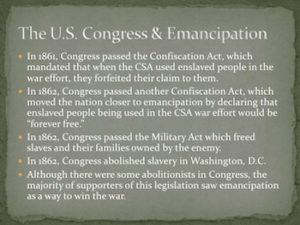
*On this date in 1862., the Confiscation Act was passed by the United States Congress.
Sometimes called the Second Confiscation Act, it was a law passed during the American Civil War. Section 13 of the act formed the legal basis for President Abraham Lincoln's Emancipation Proclamation. The defining characteristic of the Confiscation Act was that it called for court proceedings for the seizure of land and property from disloyal citizens (supporters of the Confederacy) in the South and the freedom of their slaves that came under Union control.
Under this act, treason against the U.S. could be punishable by death or carry a minimum prison sentence of five years and a minimum fine of $10,000. This law also stated that any citizen convicted of aiding and abetting any person known to have committed treason against the United States could be imprisoned for up to 10 years and face a maximum fine of $200,000 if convicted.
This law specifically targeted the seizure of property of any Confederate military officer, Confederate public office holder, persons who have taken an oath of allegiance to the Confederacy, or any citizen of a loyal Union state who has given aid or support to any of the aforementioned traitors to the United States of America. This act helped the Union military because freed slaves could supply the forces with information to gain a strategic advantage over the Confederates.